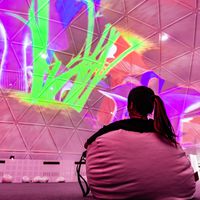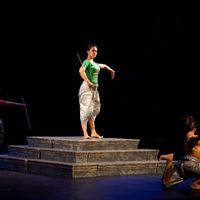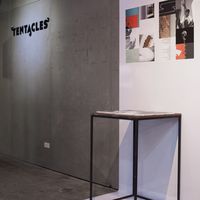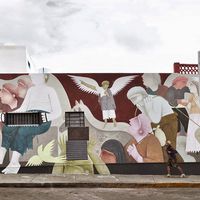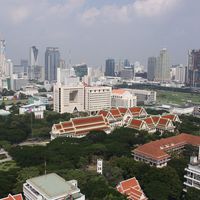FAAMAI Digital Arts Hub | Interview with Janat Thiengsurin

As part of the Media Partnership with Chulalongkorn University, culture360 has interviewed Janat Thiengsurin, FAAMAI Director, to learn more about this new project connecting art and technology developed by the Chulalongkorn University in Bangkok, Thailand.
Can you tell us more about the Faculty of Fine and Applied Arts Multidisciplinary Art Innovation Centre, or FAAMAI? When was this project initiated and with what objectives?
FAAMAI has received funding from Chulalongkorn Second Centenary Fund since November 2019. Our main objective is focused on initiating and supporting — regardless of discipline, such as visual art, design, music, and dance — the development of digital arts in Thailand; to facilitate the creation of Thai digital art and ultimately to support both the economy and society. A multidisciplinary approach is a key successful innovation to cope with digital disruption in this fast-moving world.
We found that digital technology is a great platform to bring in artists, researchers, engineers, and local entrepreneurs together in order to creatively and continuously develop meaningful projects. We hope that this iterative process might lead to the creation of new products, services and artworks which might sustainably support the well-being of Thai people.
Who is FAAMAI for? Are you hoping to make it available to audiences and practitioners also outside of the university and internationally?
We do hope that our facilities and equipment are accessible and available to students and researchers in Chulalongkorn University. We also hope that we can collaborate with local and international artists through practice-based research, and to encourage digital artists here in Thailand and the region.
Can you tell us more about FAAMAI Digital Art Hub: when will this be completed and what are its main features? Are you working with any partners on this?
Tools such as projectors, sensors, cameras, and software are ready to be accessed by students and researchers whilst our main features, FAAMAI dome and studio, will be operational by early next year. We have two main partners – Pico (Thailand), an experiential marketing company which has provided us with a geodesic dome, and Property Management of Chulalongkorn University (PMCU) which provided us with a plot of land to erect the dome. We also have a collaboration with Bauhaus-University of Weimar as main educational partner for fulldome projection and immersive art. We also collaborate with the government’s Department of Mental Health to develop research in full dome projection techniques to enable stress-relief; and the Office of National Higher Education Science Research and Innovation Policy Council (NXPO) to create almost 30 solar-powered light installations, which complement our Chula Art Town and to enhance local Thai-Chinese cultural values in the Suanluang-Samyan district (right next to the university’s campus).
With the current pandemic, international cultural exchanges are limited, and this will probably continue for several months. Do you think this will affect your plans for the digital art hub or on the contrary this kind of digital projects will be easier to sustain even without a physical presence?
A pandemic has many consequences, some good, some bad. Obviously, we are able to explore less in terms of physical art activities, such as projection mapping, digital sound performance, and kinetic dance which are the strengths of our faculty. However, it also means that we now have more opportunities to learn new skills, such as creative coding and holding virtual exhibitions. We are very fortunate that the pandemic positivity rate in Thailand is still low. People can enjoy artworks in both the physical and digital dimensions but we found that they tend to share their experience to each other digitally.
Where do you see FAAMAI in 5 years from now?
FAAMAI can be transformational in terms of digital arts in Thailand. Perhaps in five years, we will have digital artists learning at the faculty and their counterparts creating original digital artworks. In the long term, we also hope that we can transform digital art research projects into real products and/or services that can benefit the economy and society.
Since educational institutions in Thailand tend to be less academic and care more about the impact on local communities or businesses, FAAMAI aims to be a keen supporter of key strategic industries in Thailand.
For more info: https://www.facebook.com/chulafaamai/
Similar content
deadline
24 Nov 2020
from - to
19 Jan 2013 - 28 Jan 2013
deadline
12 Aug 2018

.JPG)
.JPG)
